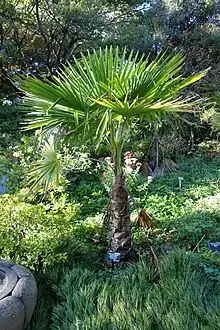Trachycarpus martianus
Trachycarpus martianus (also known as Martius' fan palm) is a tree in the family Arecaceae. There are two distinct populations: one at 1,500 m (5,000 ft) in the Khasia Hills of Meghalaya state, in northeast India, the other at 2,400 m (8,000 ft) in central northern Nepal. Other populations have been reported in Assam, Sikkim, Burma and southern China.[1][2] The main identifying characteristics are the regular leaf splits (to about half way), the coffee bean shaped seeds (similar looking to Trachycarpus latisectus) and the bare, as opposed to fibrous trunk. The new leaf spear and edges of the petioles are covered with a white tomentum.[3][4][5]
| Trachycarpus martianus | |
|---|---|
 | |
| Scientific classification | |
| Kingdom: | Plantae |
| Clade: | Tracheophytes |
| Clade: | Angiosperms |
| Clade: | Monocots |
| Clade: | Commelinids |
| Order: | Arecales |
| Family: | Arecaceae |
| Tribe: | Trachycarpeae |
| Genus: | Trachycarpus |
| Species: | T. martianus |
| Binomial name | |
| Trachycarpus martianus (Wall. ex Mart.) H.Wendl. | |
| Synonyms[1] | |
| |
The species is named after the German botanist Carl Friedrich Philipp von Martius (1794-1868).[6]
It is used in making Jhapi, a traditional head cover often used to felicitate guests in Assam.
References
- Kew World Checklist of Selected Plant Families, Trachycarpus martianus
- B. S. Kholia (March 2012). "Rediscovery of Trachycarpus martianus in the Sikkim Himalaya" (PDF). Palms. 56 (1).
- Martin Gibbons. A pocket guide to Palms.
- Wendland, Hermann A. 1861. Bulletin de la Société Botanique de France 8: 429, Trachycarpus martianus.
- Martius, Carl Friedrich Philipp von. 1831. Plantae Asiaticae Rariores 3: 5–6, t. 211, Chamaerops martiana
- Genaust, Helmut (1976). Etymologisches Wörterbuch der botanischen Pflanzennamen ISBN 3-7643-0755-2